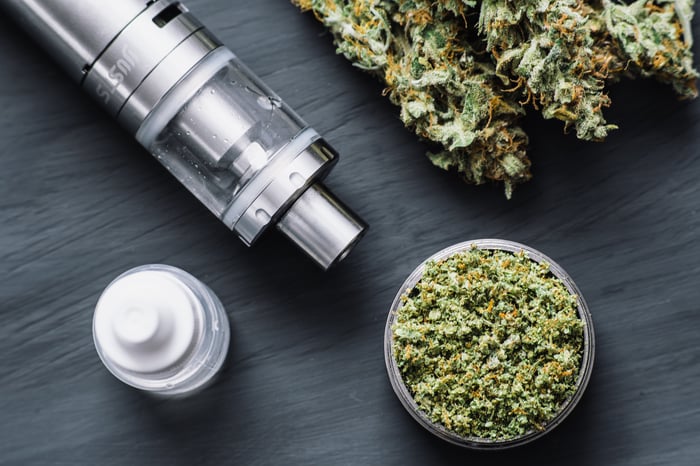Over the next decade, you'd probably struggle to find a faster-growing industry than legal marijuana. According to some estimates, after generating less than $5 billion in worldwide sales in 2015, the legal cannabis industry is expected to grow into a $200 billion-a-year business by the end of the next decade. That's growth that has Wall Street and investors rightly excited.
Also generating a lot of buzz is the upcoming launch of derivative cannabis products in our neighbor to the north. Derivatives -- i.e., edibles, infused beverages, vapes, topicals, and concentrates -- are set to hit dispensary shelves in Canada by mid-December, which is important since these products have considerably juicier margins than dried cannabis flower. Derivatives are also a more attractive means of appealing to a younger generation of pot users.

Image source: Getty Images.
The promise and early-stage peril of vape products
Among derivative marijuana products, none is expected to be more popular than vaporizer pens and accessories. According to a research presentation from Cowen Group early in 2019, vaporizer pens and accessories are expected to make up 23% of U.S. sales, which likely implies a similar sales breakdown in Canada. This is why so many cannabis stocks have set aside a place in their product portfolios for vape pens and accessories.
However, there are growing concerns among the medical community regarding the safety of vaping, especially with a number of mysterious lung diseases cropping up of late.
According to U.S. health officials, more than 450 cases of vaping-related lung illnesses have now been reported in 33 U.S. states and one territory. Of these cases, five have resulted in patient deaths.
To be crystal clear, health agencies, including the Centers for Disease Control and Prevention, are unclear what's specifically to blame for these thus far mysterious illnesses. However, a joint investigation of 53 patients between the Wisconsin and Illinois health departments found that 84% of patients had consumed tetrahydrocannabinol (THC) (the cannabinoid that gets users high) from an electronic-cigarette device. Nevertheless, it paints a worrisome early-stage correlation between THC-infused products and vaping.

Image source: Getty Images.
Certain vape-focused pot stocks could be adversely impacted by growing health concerns
Obviously, further study is needed and ongoing, albeit it may take time before researchers in the U.S. are able to narrow down what, specifically, has been leading to this mysterious rise in lung illnesses. This cloud of uncertainty could wind up posing a real threat to a handful of cannabis stocks that are counting on vape pens and accessories to be a major contributor to their top and bottom lines.
Cronos Group (CRON -0.82%), which completed a $1.8 billion equity investment from tobacco kingpin Altria (MO 0.86%) in mid-March in exchange for a 45% non-diluted equity stake in the company, is one name that could feel the effect of growing worries surrounding vape safety. Altria also owns a 35% stake in Juul, a popular vaping device that's recently drawn the ire of the U.S. Food and Drug Administration for the way it marketed its product as a purportedly safer alternative than smoking tobacco cigarettes.
The idea behind this equity investment, aside from the fact that it gave Cronos Group a war chest to acquire new brands and expand internationally, is that it allows Altria to expand into the rapidly growing cannabis industry, while giving Cronos access to Altria's vaping technology, brands, and marketing prowess.
However, no amount of knowledge may wind up protecting Cronos and Altria from a weaker-than-expected launch of cannabis vape products this coming December if health concerns continue. What's more, it's unlikely that supply-chain problems that have been persistent with dried cannabis flower since recreational weed sales began in October 2018 will be resolved by the time vape products launch.

Image source: Getty Images.
These concerns could also hamper the results of vaporizer suppliers, such as Greenlane Holdings (GNLN -5.87%) and KushCo Holdings (KSHB).
Greenlane, which is one of around a dozen cannabis stocks to trade on a major U.S. exchange, offers vaporization products throughout its network of approximately 11,000 retail doors in North America. Keep in mind that Greenlane offers far more than just vaporizers to cannabis, tobacco, and e-cigarette enthusiasts, but vaporizers are nevertheless a significant chunk of annual sales. Having early deals in place with well-known vape brands like Storz & Bickel (now a subsidiary of Canopy Growth) is a big reason Greenlane is such an accessories giant.
Meanwhile, KushCo is nowhere near the size of Greenlane in terms of vaporizer distribution, but it does generate the bulk of its revenue for the time being from vaporizers and related accessories. If higher costs associated with the trade war weren't enough -- quite a few vaporizer pens and products are imported from China -- KushCo now has to deal with the possibility of health concerns stymying vaporizer sales. Thankfully, the company also offers packaging and branding solutions to pot growers and sells hydrocarbon gases used in the production of various marijuana derivatives.
The point is that until there's some certainty surrounding this recent health scare, all companies with notable ties to the vaping industry, including pot stocks, could feel some pressure.





